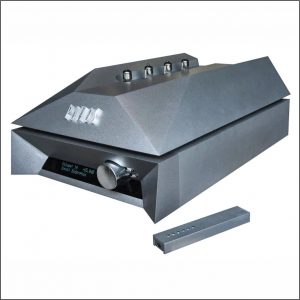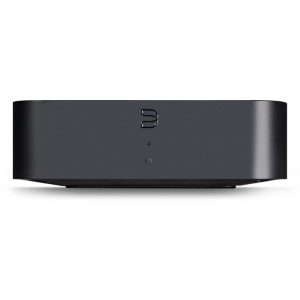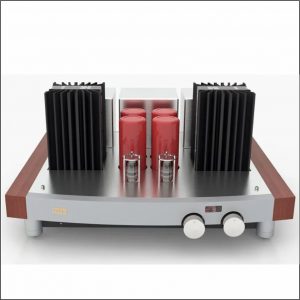Description
Solo SRGII– Headphone Amplifier

Dedicated To The Solo Headphone Listener
All of the Solo’s amplification is concentrated into its single stereo ouput – it doesn’t compromise on sound like multiple outputs will. If you listen on your own it’s the ideal headphone amp!
Plus it offers an easy and simple upgrade path which involves swapping its outboard “green-energy” power supply to our PSU1.
SRG stands for Studio Reference Green. SRGII is the MkII version. It’s available “in green” with its energy saving basic power supply – or go straight for the upgrade and buy it with the PSU1 power supply.
Delivering Wonderful Music Under Adverse Conditions
The Solo’s have a long history of delivering wonderful music going back to 2001 as borne out in numerous reviews over the years – often beating off stiff competition from more expensive headphone amps.
The “green” Solo surfaced in 2007 as the first ever seriously hi-fi headphone amplifier to succesfully run off green energy otherwise known as switched-mode power.
It had to be done because legislation on energy using products was about to become a legal requirement by 2010, and switched-mode power supplies have since become the de-facto source of outboard power for economy product variants such as the less-expensive Solo SRGII option.
The problem earlier hi-fi products had was that switched-mode power has so much high-frequency distortion content, and as all amplifiers output what is essentially signal-modulated power, that distortion content ends up at your headphone diaphragms.
The complex behaviour of such distortion content with headphone diaphragm earpieces, not forgetting the amplifier itself, simply throttles the sound.
The “green” Solo, and now the Solo SRGII, overcame the problems switched-mode power caused, but went much further and the SRGII sound can fend off competition from more expensive headphone amplifiers using non switched-mode linear power.
Headphone Impedance Sensing
The Solo SRGII headphone amplifier has another trick up its sleeve, that being its headphone impedance sensing output.
Some output impedance is essential because headphone cables are highly capacitive, and without output impedance, amplifier phase margin is seriously compromised.
High impedance headphones with long cables (and there are plenty of them) can lead to phase margin reversal and that’s why many solid-state amps don’t work well with headphone impedances much greater than 30-40 Ω.
Exactly how much output impedance can be tolerated before a headphone stops performing well, will depend on the impedance of the headphone being used – and we can never know what the customer is using.
Headphones have impedance dips and peaks across their audible spectrum, needing more control at some frequencies more than others.
Zero output impedance would be ideal, but screwing down the high frequency performance to preserve phase margin is no good for outright musical performance.
Output impedance cannot therefore be a fixed value that suits all headphones. But, by sensing the headphone current, extra power can be delivered to the headphone to cover for impedance dips, and less power for impedance peaks – thus making for a smoother sound.
The actual output resistance can be kept constant guarding phase margin whilst output impedance will appear to be changing to compensate.
And that’s basically how the Solo Studio Reference Green MkII achieves its really well-balanced sound regardless of headphone impedance.
And importantly for the most sensitive headphones, it doesn’t hiss!
Specification
| Item | Measurement |
|---|---|
| Headphone impedance range | 16 to 600 Ohms preferred; 8 to 2,000 Ohms acceptable |
| Power output (rms, both channels fully driven) | 32 Ohms: 27mW/channel; 600 Ohms: 23mW/channel |
| Distortion (THD plus noise, ref 1kHz) | 0.02% |
| Frequency response (-3dB) | 32 Ohms load: 27Hz – 35kHz; 600 Ohms load: 10Hz – 39kHz |
| Output noise (20Hz-20kHz, CCIR quasi-peak) | -84dB |
| Input sensitivity (for specified power output) | 32 Ohms: 250mV rms; 600 Ohms: 775mV rms |
| Channel balance | better than 1dB, “9 to 3 o’clock” positions |
| Crosstalk | Left to Right -57dB; Input to Input -68dB |
| Mute | Signal off mute, non-shorting |
| Output Stage | Bipolar class AB |
| Supply voltage | 24V DC |
| Size (approx.) | W: 107 x H: 50 x D: 185 (mm) inc. controls |




